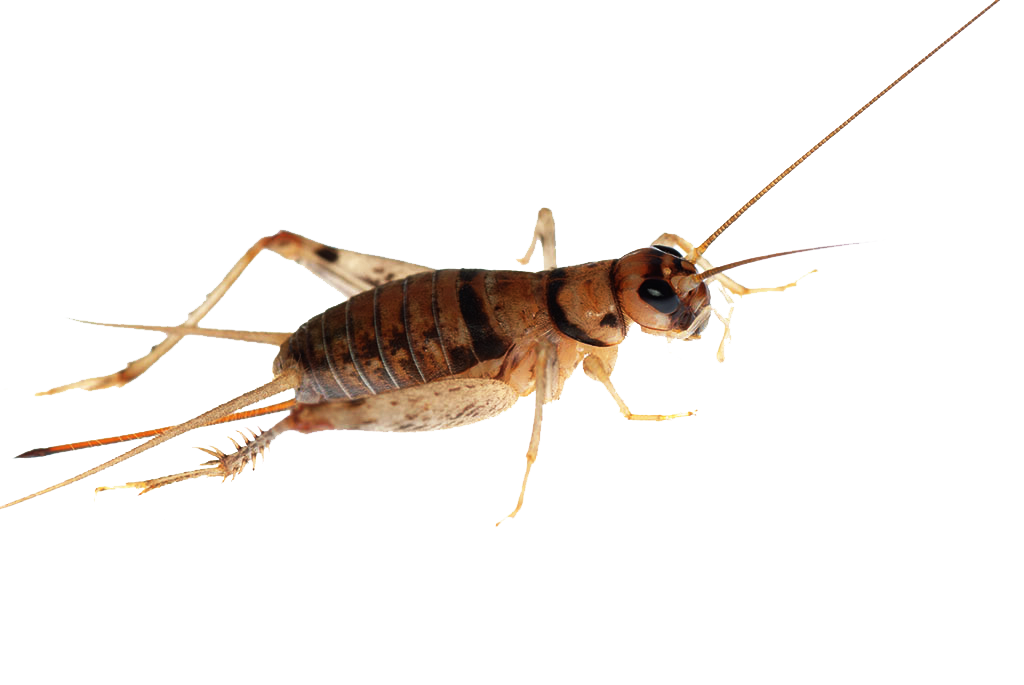
This image has format transparent PNG with resolution 1024x685.
You can download this image in best resolution from this page and use it for design and web design.
Cricket insect PNG with transparent background you can download for free, just click on download button.
Crickets (also known as "true crickets"), of the family Gryllidae, are insects related to bush crickets, and, more distantly, to grasshoppers. The Gryllidae have mainly cylindrical bodies, round heads, and long antennae. Behind the head is a smooth, robust pronotum. The abdomen ends in a pair of long cerci (spikes); females have a long, cylindrical ovipositor. The hind legs have enlarged femora (thighs), providing power for jumping. The front wings are adapted as tough, leathery elytra (wing covers), and some crickets chirp by rubbing parts of these together. The hind wings are membranous and folded when not in use for flight; many species, however, are flightless. The largest members of the family are the bull crickets, Brachytrupes, which are up to 5 cm (2 in) long.
More than 900 species of crickets are described; the Gryllidae are distributed all around the world except at latitudes 55° or higher, with the greatest diversity being in the tropics. They occur in varied habitats from grassland, bushes, and forests to marshes, beaches, and caves. Crickets are mainly nocturnal, and are best known for the loud, persistent, chirping song of males trying to attract females, although some species are mute. The singing species have good hearing, via the tympana (eardrums) on the tibiae of the front legs.
Crickets often appear as characters in literature. The Talking Cricket features in Carlo Collodi's 1883 children's book, The Adventures of Pinocchio, and in films based on the book. The eponymous insect is central to Charles Dickens's 1845 The Cricket on the Hearth, as is the chirping insect in George Selden's 1960 The Cricket in Times Square. Crickets are celebrated in poems by William Wordsworth, John Keats, and Du Fu. They are kept as pets in countries from China to Europe, sometimes for cricket fighting. Crickets are efficient at converting their food into body mass, making them a candidate for food production. They are used as food in Southeast Asia, where they are sold deep-fried in markets as snacks. They are also used to feed carnivorous pets and zoo animals. In Brazilian folklore, crickets feature as omens of various events.
rickets are small to medium-sized insects with mostly cylindrical, somewhat vertically flattened bodies. The head is spherical with long slender antennae arising from cone-shaped scapes (first segments) and just behind these are two large compound eyes. On the forehead are three ocelli (simple eyes). The pronotum (first thoracic segment) is trapezoidal in shape, robust, and well-sclerotinized. It is smooth and has neither dorsal or lateral keels (ridges).
At the tip of the abdomen is a pair of long cerci (paired appendages on rearmost segment), and in females, the ovipositor is cylindrical, long and narrow, smooth and shiny. The femora (third segments) of the back pair of legs are greatly enlarged for jumping. The tibiae (fourth segments) of the hind legs are armed with a number of moveable spurs, the arrangement of which is characteristic of each species. The tibiae of the front legs bear one or more tympani which are used for the reception of sound.
The wings lie flat on the body and are very variable in size between species, being reduced in size in some crickets and missing in others. The fore wings are elytra made of tough chitin, acting as a protective shield for the soft parts of the body and in males, bear the stridulatory organs for the production of sound. The hind pair is membranous, folding fan-wise under the fore wings. In many species, the wings are not adapted for flight.
The largest members of the family are the 5 cm (2 in)-long bull crickets (Brachytrupes) which excavate burrows a metre or more deep. The tree crickets (Oecanthinae) are delicate white or pale green insects with transparent fore wings, while the field crickets (Gryllinae) are robust brown or black insects.
In this page you can download free PNG images: Cricket insect PNG images free download